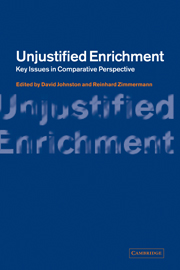Book contents
- Frontmatter
- Contents
- List of contributors
- Preface
- Table of cases
- List of abbreviations
- I Introduction
- II Enrichment ‘without legal ground’ or unjust factor approach
- III Failure of consideration
- IV Duress and fraud
- V Change of position
- VI Illegality
- VII Encroachment and restitution for wrongs
- VIII Improvements
- IX Discharge of another person's debt
- X Third-party enrichment
- XI Proprietary issues
- XII Taxonomy
- 22 Taxonomy: does it matter?
- 23 Rationality, nationality and the taxonomy of unjustified enrichment
- Index
22 - Taxonomy: does it matter?
Published online by Cambridge University Press: 31 July 2009
- Frontmatter
- Contents
- List of contributors
- Preface
- Table of cases
- List of abbreviations
- I Introduction
- II Enrichment ‘without legal ground’ or unjust factor approach
- III Failure of consideration
- IV Duress and fraud
- V Change of position
- VI Illegality
- VII Encroachment and restitution for wrongs
- VIII Improvements
- IX Discharge of another person's debt
- X Third-party enrichment
- XI Proprietary issues
- XII Taxonomy
- 22 Taxonomy: does it matter?
- 23 Rationality, nationality and the taxonomy of unjustified enrichment
- Index
Summary
Some parts of the subject are very interesting, and here and there it seems, though I may be wrong, that the law is still unsettled even on rudimentary points, and in such matters one feels the excitement of an explorer.
One might be forgiven for thinking that this statement was made by a lawyer writing about the law of restitution. Indeed, references can be found in modern writings on the law of restitution to the ‘sense of excitement that comes from working as a pioneer’. But in fact the statement was written towards the end of the nineteenth century by Sir William Anson (as he was later to become) in a letter to Lord Justice Thesiger, his former pupil-master, on the publication of the first edition of his path-breaking book on the law of contract. Today, the word ‘explorer’ would not readily jump into one's mind if asked to describe a contract lawyer. The contours of the subject are now well defined. The modern contract lawyer is no longer thought of as an architect; rather, he or she resembles a plumber trying to repair the many leaks in the system and the leaks seem to increase as the system becomes ever more antiquated.
Yet in many ways Pollock and Anson were explorers. From the forms of action and the mass of detailed case law, they sought to deduce principles that were of general application.
- Type
- Chapter
- Information
- Unjustified EnrichmentKey Issues in Comparative Perspective, pp. 627 - 657Publisher: Cambridge University PressPrint publication year: 2002
- 2
- Cited by



